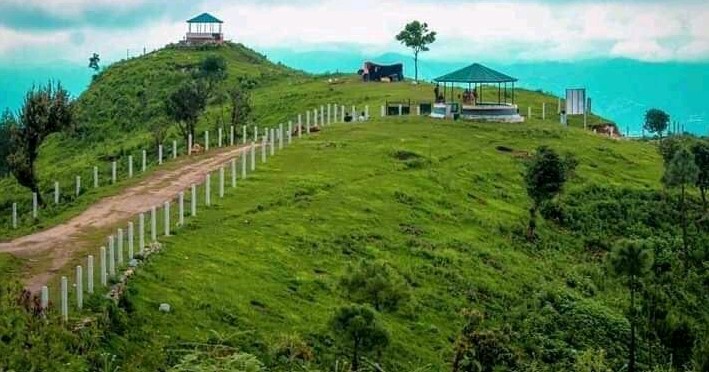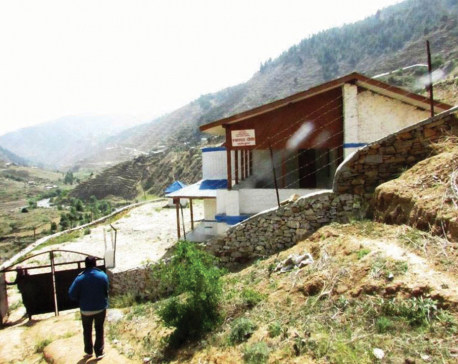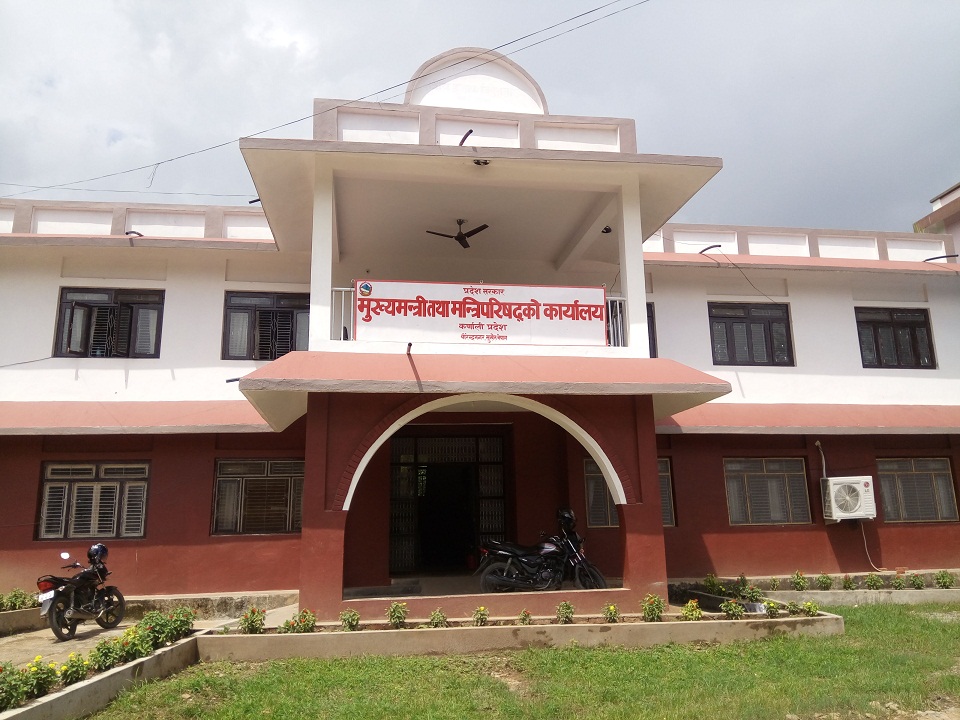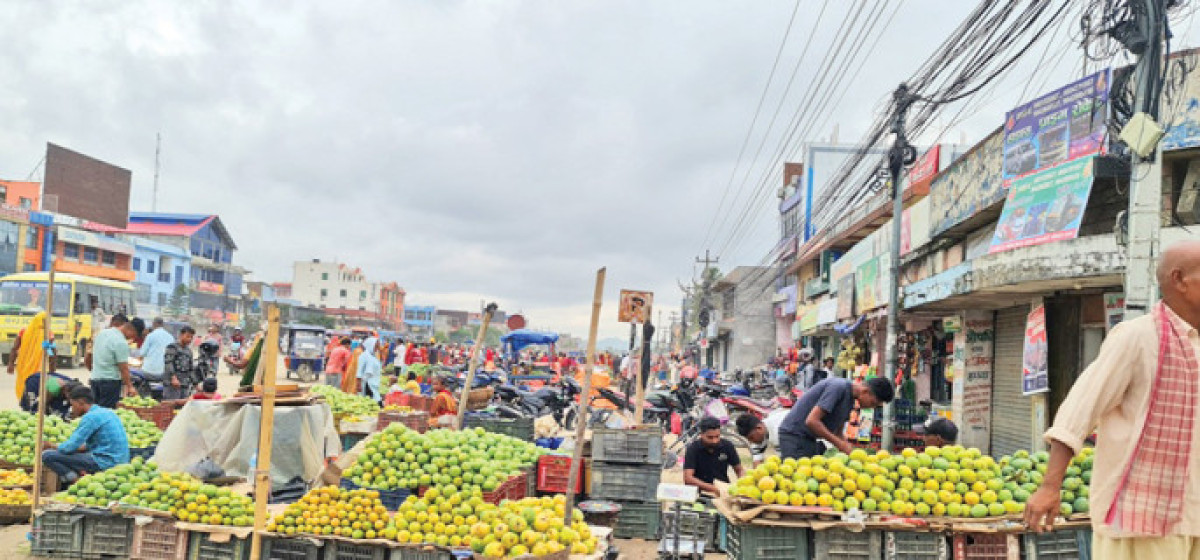
OR
Gulmi Durbar Rural Municipality

Jeevlal Poudel, from ChilawniPokhara in GulmiDarbar Rural Municipality-6, is 81 years old and walks with the help of a cane. He faces difficulty when walking uphill and downhill, and knee pain prevents him from traveling long distances. Until a few years ago, he had to go to Goudakot, a market area with a bank, to collect his old age allowance provided by the government, and he needed the assistance of a family member to accompany him. However, senior citizens like Jeevlal have been greatly relieved after the local government launched a door-to-door service campaign to address the problems faced by its citizens.
“Earlier, older people like us had to suffera lot. But now people's representatives and bank employees come to our homes and give us our old age allowances. Not only this, even the doctors and nurses visit our houses to inquire about our health,” Jeevlal praised the local government in his own language and style, “May God bless those who serve the elderly!”
The local people of Gulmi district, located in a remote area, have benefited from the door-to-door services provided by Gulmi Durbar Rural Municipality. The municipality offers various services, including social security allowance, medical services for the elderly, distribution of identification cards, mobile soil testing camp for farmers, health check-ups for livestock, and medicine distribution.
According to Saroj Kumar Thapa, the chairman of the rural municipality, their first priority is to provide efficient, people-friendly, and convenient service delivery. The municipality offers a variety of services, including social security allowance, medical services for the elderly, distribution of identification cards, and mobile camps for soil testing and health check-ups for livestock. In addition, the municipality pays for the minimum electricity tariff of its citizens to provide relief.
The Chief Administrative Officer (CAO) of the rural municipality, Laxman Prasad Pandey, has stated that the municipality has prioritized good governance, education, health, agriculture, and employment in its policies, programs, budgets, and plans. Specifically, the municipality has prioritized various health programs, including first aid, nutrition, safe motherhood, programs for senior citizens and teenagers, upgrades to health institutions, and improved service delivery.
According to Narayan Prasad Aryal, Head of the Health Branch, the 'Meri Aama, SwasthaAama' (My Mother, Healthy Mother) program has been implemented to reduce maternal and child mortality rates. As part of the program, a team of health workers and public representatives visit the homes of pregnant women to congratulate them and provide regular check-ups and nutritious gifts. Additionally, the program includes the ‘Vice-chairperson Souvenir’ program for mothers and children up to 1,000 days old, as well as regular health check-ups for newborns.
The municipality has been providing free ambulance services for pregnant women to ensure timely and safe transportation to health institutions. In cases where the municipality's ambulance is not available, the municipality has a provision to reimburse the expenses incurred for using another vehicle to reach the health institution. “Since the implementation of this campaign, 78 pregnant women have received free ambulance services,” said Aryal.
The municipality has implemented a 'rural ultrasound program' to provide pregnancy ultrasounds on a monthly basis at the health post of each ward. The municipality distributes the necessary equipment to each health post for this purpose. Additionally, the municipality has launched the 'SathiShiksha' program in schools to educate young people about the physical and health changes and problems that occur during adolescence. Head of the Health Branch, Aryal mentioned that the municipality delivers first aid services door-to-door in coordination and cooperation with health workers, mothers' groups, and cooperative members.
Likewise, the municipality has arranged for the provision of free medicines to senior citizens with chronic diseases such as high blood pressure and diabetes after conducting health check-ups at home. Additionally, in collaboration with the district eye treatment center, surgery for eye-related diseases is free of cost. When the local government came to the municipality earlier, there was not a single health institution with a building that met the standards. However, in the last five years, the health posts of five wards have been operated in buildings that meet the standards, while one is currently under construction. There is a basic health service building and four birthing centers. Moreover, the construction of a 15-bed hospital is 90 percent complete, thanks to the monitoring and vigilance of the local government. The municipality has 39 schools, including 37 public and two private schools. According to Narendra Prasad Sharma, a resource person from the education branch, the municipality is playing a vital role in increasing student enrollment to 100 percent, improving the educational quality of community schools, and developing the sports sector.
“The municipality has also started business registration, renewal and planning agreement work from the ward level as part of the door-to-door service. For that, a team including employees, technicians and related parties from the relevant divisions of the municipality reached the ward level and arranged the planning agreement,” said Rural Municipality Vice Chairperson Tara ThapaDhenga. He added, “When the plans are discussed in the ward, the locals get information about the plans and feel a sense of belonging while they are also monitored and alerted to the projects.”
The municipality has been orienting the officers and representatives of the consumer committee to make service delivery and development effective, accountable, and transparent. "Making the municipality well-governed is our main responsibility, so we want the people here to monitor each and every activity of the rural municipality," said Thapa, chairman of the rural municipality.
Local resident PrabinGaha of Jubhung-2, who is also a journalist, said that while there are big cases of corruption taking place in the country, Gulmi Durbar is very appreciative of making the local people aware to keep a watch on themselves. "Since the rural municipality has ensured the participation of local people in programs and schemes related to health, food, water, agriculture and employment, the effectiveness and achievements of those programs have been seen to be good. Citizens are able to feel that the government is really working for their good," said Gaha.
Before the arrival of the local government, basic services such as education, health, water, roads, and electricity were unable to reach the villages of Gulmi Durbar for nearly two decades. This, coupled with the lack of irrigation, agricultural technology, and marketing, led to an increase in farmer migration and unemployment. Many people also left the hill settlements for the plains in search of employment. However, since the local government came into power in 2074 BS, this municipality has shown that rural villages can also prosper and develop. The government has launched various campaigns to bring back youths who are employed in foreign jobs to their villages.
While Tribhuvan International Airport in Kathmandu and Gautam Buddha International Airport in Bhairahawa are crowded with young people migrating abroad for employment and studies, Megh Bahadur Ghimire of Gulmi Durbar-3 Pauwakhark is earning a better income from commercial agriculture than those who go abroad. He operates a vegetable, fruit, nursery, and animal farm by leasing 150 ropanis of land, earning from 1 to 1.5 million rupees annually. "After the local government said that they would help us to work, farmers like us are encouraged to stay and work in our own country," Ghimire said.
Abiskar Khatri, the village's agriculture officer, explained that the rural municipality has launched a program to promote employment and entrepreneurship through commercial agriculture, in an effort to discourage foreign employment among farmers. As part of this program, subsidies are provided to farmers based on their milk production. The municipality has also organized mobile camps to provide health check-ups for cattle and distribute free medicine, as well as offer subsidies for fruit and vegetable seeds, materials for drip irrigation, and assistance in tunnel construction. Additionally, with the support of the non-governmental organization Heifer International, the municipality has provided subsidies for advanced breeds of goats and for advanced grass and fodder for commercial goat rearing.
The municipality has introduced mandatory soil testing to increase commercial agriculture productivity, focusing on vegetables, legumes, fruits, and grains. They have arranged for a soil testing machine to test the organic carbon, phosphorus, potassium, pH value, and nitrogen in the soil. After testing, farmers are advised on suitable crops and are provided with a subsidy program. The municipality also provides barren land to farmers who want to cultivate through the land bank program.
Due to these efforts of the local government, this rural municipality is becoming self-sufficient in animal husbandry, vegetables, honey, meat and dairy products. When the local government extended its hand of support, those who have returned from foreign employment and those who have returned after retiring from the Indian Army also formed a group and engaged in commercial agriculture.
The rural municipality's chairman, Saroj Kumar Thapa, said that they are planning to provide an additional 25 percent investment to those who want to start a business with remittance money, in order to encourage youths working abroad to return to their village. The rural municipality has also implemented the ‘One House, One Water Tap’ program, with 80 percent of houses supplied with water and the rest being worked on. Additionally, there is progress being made in the expansion and upgrading of rural roads. Thapa mentioned that the local government plays a coordinating role in the timely completion of projects run by federal and provincial governments.
The rural municipality is aware of the migration problem in the hill settlements and is taking initiatives to provide income-generating and skill-based training for women to keep the local youth in the villages. Along with developing commercial agriculture, small entrepreneurship, and sports sector, the rural municipality is conducting programs at the community level to maintain gender equality while making the rural municipality violence-free. The vice chairperson of the rural municipality, Tara ThapaDhenga, mentioned these efforts.
This rural municipality may not be the epitome of perfection or possess all the necessary facilities for development and service, but the local government's unwavering commitment to progress and prosperity has made a significant impact in the past few years. With initiatives that cater to the areas of education, health, employment, food, water, tourism, agriculture, and physical infrastructure, the local people have newfound hope for a brighter future.
In fact, the rural municipality has surpassed all expectations by ranking among the top 23 best-performing local governments out of the 753 in the country. This achievement is a testament to the tireless efforts and dedication of the local government towards the betterment of its people and the development of its community.
You May Like This

Local Governments: Responsibilities and Requirements
The local governments receive conditional money from the federal and provincial governments. That may not address all local needs. So,... Read More...

Ward chairperson thrashes local youth in Siraha
SIRAHA, Aug 14: Ward chairperson of Siraha Municipality Ward No 18 Ram Sogarath Yadav has thrashed a youth of the... Read More...

Local government fails to bring any change to health sector
JUMLA, Sept 5: There are four government health institutions in Chandanath Municipality of the district headquarters Khalanga. Sadly, all of... Read More...


Just In
- 70 community and national forests affected by fire in Parbat till Wednesday
- NEPSE loses 3.24 points, while daily turnover inclines to Rs 2.36 billion
- Pak Embassy awards scholarships to 180 Nepali students
- President Paudel approves mobilization of army personnel for by-elections security
- Bhajang and Ilam by-elections: 69 polling stations classified as ‘highly sensitive’
- Karnali CM Kandel secures vote of confidence
- National Youth Scientists Conference to be organized in Surkhet
- Rautahat traders call for extended night market hours amid summer heat

















Leave A Comment